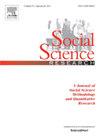Punishing “gender deviants”? Women born in the year of the white horse and college selectivity
IF 3.2
2区 社会学
Q1 SOCIOLOGY
引用次数: 0
Abstract
Belief in the Chinese zodiac, a cultural belief widely held in East Asian cultures, posits that people are fated to have different traits according to the zodiac animal attached to their birth year. As a white horse is culturally associated with masculine traits, Korean women born in the White Horse year are presumed to be argumentative, headstrong, and born with “too much” Yin energy. In this study, we analyze a nationally representative sample of Korean college graduates to examine whether and how being born in the White Horse year, thereby being chronically exposed to gender stereotype-violating stigma, affects women's higher educational attainment. Our difference-in-differences models show that White Horse women, on average, entered colleges of lower selectivity than did non-White Horse women, whereas no such disadvantage was attached to White Horse men. The results also suggest that, although the negative impact of the White Horse stigma is more salient for socioeconomically disadvantaged White Horse women than for their advantaged counterparts, the difference between the two groups does not reach statistical significance. We discuss the implications of these findings with emphasis on the role of sheer presumptions about gendered expectations in reproducing social disadvantages for women.
惩罚 "性别异类"?白马年出生的女性与大学选择性
生肖信仰是东亚文化中广泛存在的一种文化信仰,它认为人的出生年份所对应的生肖注定了其不同的性格特征。由于白马在文化上与男性特质相关,白马年出生的韩国女性被认为是好辩、刚愎自用、阴气 "太重 "的人。在本研究中,我们对具有全国代表性的韩国大学毕业生样本进行了分析,以研究白马年出生是否会以及如何影响女性的高等教育成就,因为白马年出生的女性长期暴露在违反性别刻板印象的污名之下。我们的差异模型显示,平均而言,白马女性进入大学的选择性低于非白马女性,而白马男性则没有这种劣势。研究结果还表明,尽管白马烙印的负面影响对社会经济条件较差的白马女性比对条件较好的白马女性更为突出,但两组之间的差异并没有达到统计学意义上的显著性。我们讨论了这些研究结果的影响,重点是关于性别期望的纯粹假定在复制妇女的社会劣势方面所起的作用。
本文章由计算机程序翻译,如有差异,请以英文原文为准。
求助全文
约1分钟内获得全文
求助全文
来源期刊

Social Science Research
SOCIOLOGY-
CiteScore
4.30
自引率
4.00%
发文量
0
审稿时长
65 days
期刊介绍:
Social Science Research publishes papers devoted to quantitative social science research and methodology. The journal features articles that illustrate the use of quantitative methods in the empirical solution of substantive problems, and emphasizes those concerned with issues or methods that cut across traditional disciplinary lines. Special attention is given to methods that have been used by only one particular social science discipline, but that may have application to a broader range of areas.
 求助内容:
求助内容: 应助结果提醒方式:
应助结果提醒方式:


